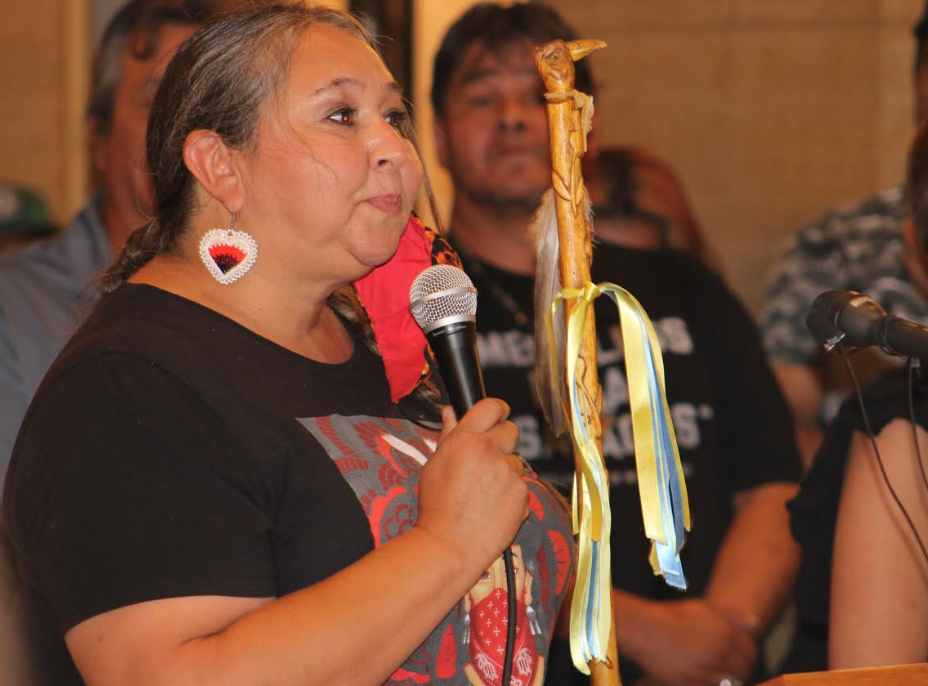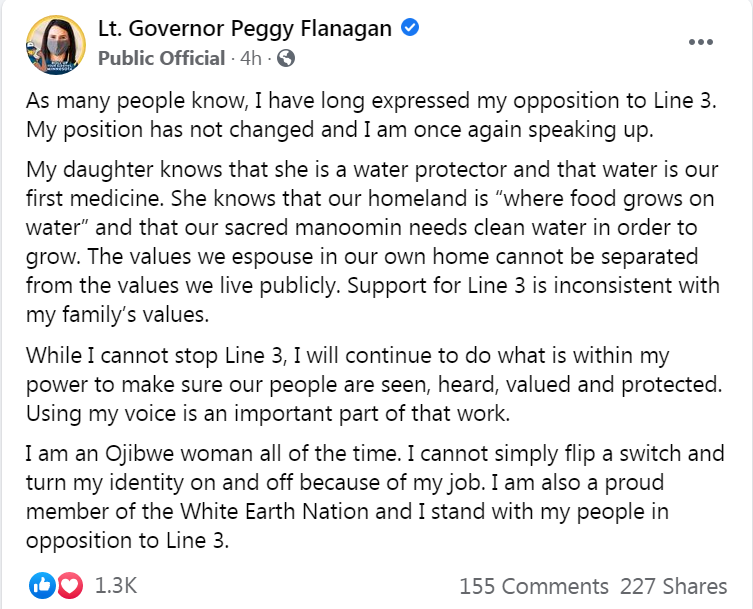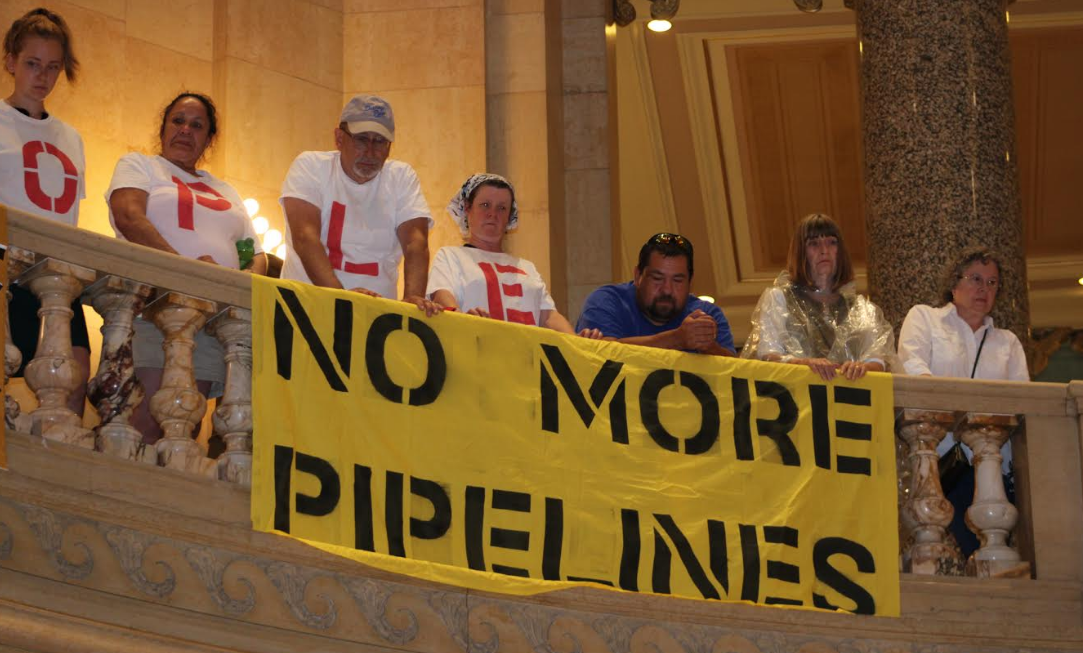
- Details
- By Darren Thompson
ST. PAUL, Minn. — Minnesota Lt. Gov. Peggy Flanagan, a tribal citizen of the White Earth Nation of Ojibwe, is facing pressure from the White Earth Tribal Council to stop Enbridge’s tar sands Line 3 oil pipeline.
Several organizations, including the White Earth Tribal Council, the Sierra Club, the RISE Coalition, and several members of the Minnesota State Legislature held a rally inside the Minnesota State Capital Building.
Want more Native News? Get the free daily newsletter today.
Speakers and demonstrators demanded that Minnesota Governor Tim Walz and Lieutenant Governor Peggy Flanagan stop the Line 3 tar sands oil pipeline in northern Minnesota and honor treaty rights.
“Peggy Flanagan, Tim Walz, President Biden, Secretary of Interior Debra Haaland—Stop Line 3!” said 13-year-old White Earth tribal citizen Silas Neeland to a crowd of approximately 200 people.
Other speakers at the demonstration included White Earth Tribal Chairman Mike Fairbanks, White Earth Tribal Secretary/Treasurer Alan Roy, several representatives of the White Earth Tribal Council, co-founders Dawn Goodwin and Nancy Beaulieu of the RISE Coalition, Sierra Club Executive Director Michael Brune, and several representatives of the Minnesota State Government.
“I’m disappointed that we came all this way and she didn’t even bother to show up,” said Karen Wadena, an enrolled citizen of the White Earth Band of Ojibwe from Naytahwaush, Minn., of Flanagan.
Flanagan maintains she does not have the ability as the second highest ranking elected official of the state of Minnesota to stop the controversial pipeline.
“While I cannot stop Line 3, I will continue to do what is within my power to make sure our people are seen, heard, valued and protected,” Peggy Flanagan said on a Facebook post after the demonstration. “I stand with my people in opposition to Line 3.” Flanagan is an enrolled member of the White Earth Band of Ojibwe.

A request from Native News Online for comment was unanswered from Governor Tim Walz and Lt. Gov. Peggy Flanagan’s press secretary as of press time.
“This is the most important fight in the country right now,” said Sierra Club Executive Director Michael Brune, who drove with his family to attend the demonstration in Saint Paul, Minn., from California. “This is a fight about tribal sovereignty, corporate control, air, water, climate, our democracy, and our people.”
In recent weeks protest activity has increased near the pipeline’s route and more than 500 people have been arrested or issued citations since construction began in Minnesota. Today, the White Earth Band of Ojibwe, the Red Lake Band of Chippewa, the Sierra Club, and Honor the Earth asked the Minnesota Supreme Court to overturn a lower court’s decision that approved permits granted by independent regulators. The permits allowed construction to begin last December.
President Biden could still decide to withdraw the federal permits that gives the pipeline the permission it needs for construction. Ojibwe tribes in Minnesota are concerned about the more than 200 water bodies the pipeline will cross. Leaders contend that a spill or lead could contaminate the water, affecting wild rice, which is protected by treaties.
“Treaties are the supreme law of the land,” said RISE Coalition Co-Founder Dawn Goodwin at the Minnesota State Capital.

In 2019, the White Earth Band of Ojibwe passed a Rights of Manoomin, rights of Wild Rice, Resolution, and became tribal law. The law states that its citizens must protect wild rice and argue that this right is protected under the American Indian Religious Freedom Act.
"All ceremonies and dancing, religious and cultural, including wild ricing were outlawed by the US Federal Government’s “Civilization Regulations” from the 1880s to the mid-1930s," said Cheyenne and Hodulgee Muscogee Suzan Shown Harjo to Native News Online.
“I believe they are right!” said Harjo of the White Earth Band of Ojibwe’s passing of the Rights of Manoomin. Harjo is a veteran of the Native religious freedom movement and was awarded a Medal of Freedom for her decades of service to Native people in 2014.
More Stories Like This
Klamath Indigenous Land Trust Purchases 10,000 Acres as Salmon ReturnTrump signs law that revokes some limits on drilling in Alaska’s National Petroleum Reserve
Southern Sierra Miwuk Nation Gets 900-Acres ofLand Back
Chilkat Indian Village Tells New Palmer Mine Owners They Are “Not Welcome” in Chilkat Valley
Tribes, Coastal Group Ask Army Corps to Revoke Permit for Texas Export Terminal
Help us defend tribal sovereignty.
At Native News Online, our mission is rooted in telling the stories that strengthen sovereignty and uplift Indigenous voices — not just at year’s end, but every single day.
Because of your generosity last year, we were able to keep our reporters on the ground in tribal communities, at national gatherings and in the halls of Congress — covering the issues that matter most to Indian Country: sovereignty, culture, education, health and economic opportunity.
That support sustained us through a tough year in 2025. Now, as we look to the year ahead, we need your help right now to ensure warrior journalism remains strong — reporting that defends tribal sovereignty, amplifies Native truth, and holds power accountable.
 The stakes couldn't be higher. Your support keeps Native voices heard, Native stories told and Native sovereignty defended.
The stakes couldn't be higher. Your support keeps Native voices heard, Native stories told and Native sovereignty defended.
Stand with Warrior Journalism today.
Levi Rickert (Potawatomi), Editor & Publisher
